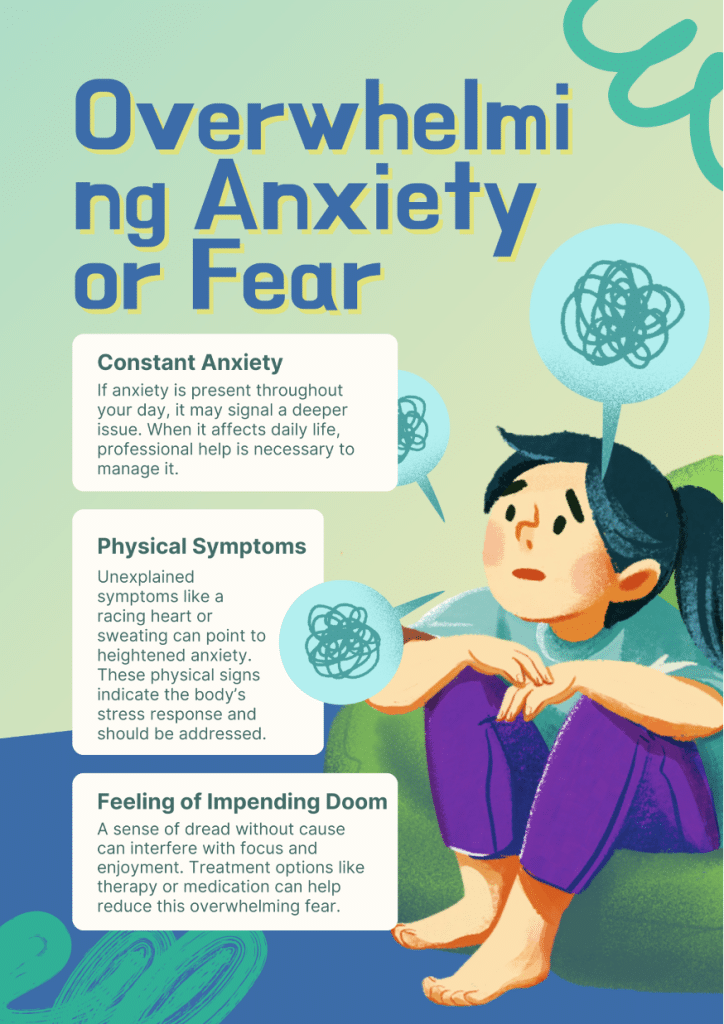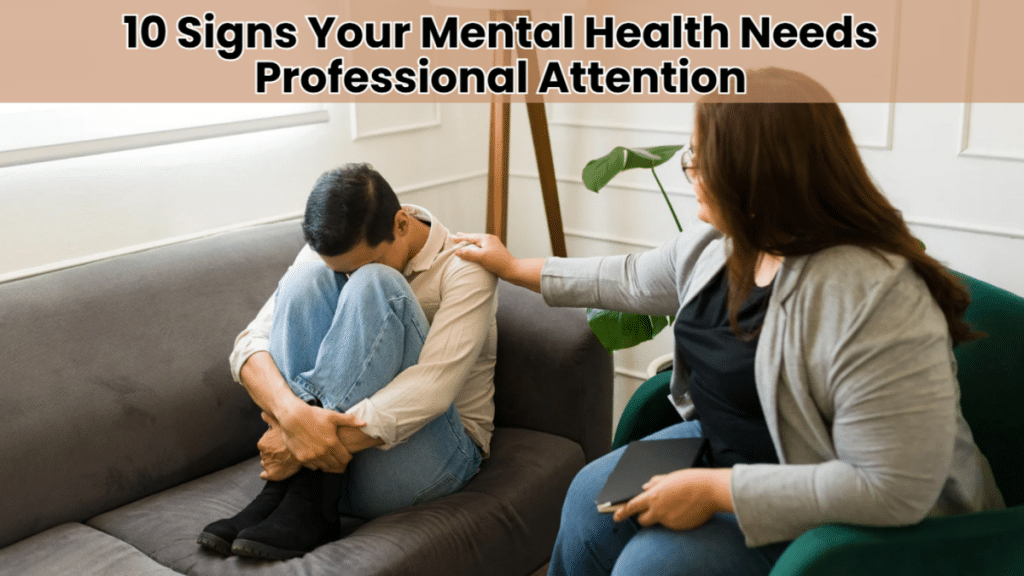Do you ever wonder if issues are more than just another day’s stress? Mental health issues can subtly infiltrate your life in ways that aren’t always obvious. Knowing when to seek professional advice may be the difference in being able to deal with some of your issues. It is not a weakness but an act of courage and self-awareness. Signs are the first steps in reclaiming your mental and emotional well-being.
Persistent Sadness or Hopelessness
It can also become chronic. Sometimes, it is okay to feel sad, but when those feelings persist for weeks or months, that might be a sign of something more serious. At their worst, persistent sadness or hopelessness can make anything seem impossible. This isn’t just about having a bad day or week. It’s about being caught in a cycle of despair that doesn’t go away.
Maybe it just leaves you wondering why you even did what you would have enjoyed once before or how the future would look after all, kind of desolate. These feelings are commonly observed in people with depression, especially when left untreated. It’s important to understand that depression can manifest in various ways, and seeking guidance through a residential therapy program can be an effective way to address these emotional shifts and receive proper care.
Overwhelming Anxiety or Fear

Everyone undergoes anxiety at some point in their lives before an exam, a job interview, or some big event. But if it becomes something that accompanies you all through the day and starts to impede your ability to live normally, then it’s about time you know something more is going on. Overwhelming fear or worry even about minute issues can make you paralyzed and not in a position to handle them.
You might find yourself having a racing heart, sweating, or shortness of breath with no reason at all. You may have a hard time focusing or experience this feeling of impending doom when nothing is wrong. These feelings can often be managed with professional intervention, including cognitive-behavioral therapy, relaxation techniques, or medication.
Significant Changes in Sleep Patterns
Sleep is strongly linked to mental health. Whether one finds it difficult to fall asleep, waking time and again at night, or finding himself sleeping a good deal more often than usual, such disturbances signal more red flags for mental problems. Usually, that can mean insomnia reflects anxiety or stress or overt sleeping indicates depression.
Sleep disorders affect not only mental health but also the whole physical well-being. Sleep deprivation can lead to irritability and difficulty concentrating. Professional guidance would identify the causative factors and provide proper solutions like therapy, techniques for sleep hygiene, and medication to regain healthy patterns of sleep.
Sudden Changes in Appetite or Weight
Your eating habits may say a lot about your mental state. Most people lose interest in food, while others begin to depend on it, seeking comfort in it or, worse, over-eating. Another very clear indication that your mental well-being needs attention is some kind of sudden weight loss or gain.
These often occur along with stress, anxiety, or depression, which perpetuates the cycle of poor food choices that continue to degrade your mood and energy levels. A therapist can highlight these patterns and work with a client to reestablish a healthy relationship with food.
Difficulty Focusing or Making Decisions
Does your condition look like some sort of fogginess of the brain? Can’t focus on doing various tasks, can’t recall information, and even the simple decisions you need to make are hard to accomplish. This is a serious matter regarding your mental health. Chances are, in most cases, that cognitive failures result from distress, anxiety, or even depression and inefficient performance at work or studies.
At this point, when your mind is filled, simple things will start overwhelming you. Therapy can help identify the emotional causes of these distractions and equip you with coping strategies.
Withdrawal from Friends and Family
Isolation may sometimes be a way of escaping, but withdrawal from loved ones is more of a pointer to deeper issues. You might start declining social events, stop picking up calls or messages, or feel emotionally disconnected from people who care for you.
Even though isolation may sometimes be needed, long withdrawal can even worsen loneliness and feelings of hopelessness. Reconnection to an atmosphere of support and counseling is the best way to develop relationships and find comfort in the community.
Unexplained Body Pain
Problems in your mind don’t stay in your head and can affect your body too. Unexplained aches, frequent headaches, stomach problems, or fatigue may be due to emotional distress rather than physical illnesses.
If there is no real finding after medical evaluation, perhaps it should be accepted that it may be stress, anxiety, or depression. Mental professionals can cure this type of disorder, and that might also heal both mental and physical states as well. Extreme mood swings is:
Such rapid shifts between highs and lows would leave you unstable and exhaustible. One minute you’re happy, the other you are irritable and sad. Such swings cause you to disrupt relationships at work and even your quality of life.
Conditions like bipolar disorder are usually accompanied by extreme mood swings, and professional help is required to control such problems. Therapy and medication can stabilize emotions and enhance your ability to cope with life’s ups and downs.
Loss of Interest in Hobbies or Activities
When you don’t find a way to enjoy things that you once loved doing, it is like you lose a part of yourself. Whether you are talking about playing sports, creating art, or hanging out with friends, this sort of disinterest is among the most frequent signs of depression or burnout.
Seek professional help to rekindle the passions in life. With the guidance of therapy, you will uncover the reasons why you feel disinterested in life, and you will be brought back to your life.
Thoughts of Self-Harm or Suicide
Perhaps the most serious and urgent indication that your mental health may need some attention is thoughts of self-harm or suicide. This is usually associated with feelings of hopelessness, which can also give an impression that the difficulties of life cannot be overcome.
If you’re experiencing these thoughts, reach out to a trusted friend, family member, or mental health professional immediately. Crisis hotlines are available to provide confidential, round-the-clock support. Remember, help is always available, and your life matters.
Seeking Help Is a Strength
Those are signs not of failure, but rather of self-awareness. It’s a reality of being human, struggling with mental health challenges: the act of facing that is resilience and courage, and professionals in mental health can provide unique solutions in therapy, medication, or other interventions.
The first step toward a healthier and more fulfilling life is seeking help. You do not have to go through these struggles alone. Taking action empowers you to heal, grow, and thrive.
Conclusion
Recognizing when your mental health needs attention is the first and most important step in the journey toward healing and well-being. Whether you’re experiencing persistent sadness, overwhelming anxiety, or physical symptoms without a clear cause, understanding these signs can help you take proactive measures before things worsen.
Seeking professional help is not a sign of weakness but an empowering decision to prioritize your mental health. Remember, you’re not alone—mental health professionals are there to guide and support you through challenging times. By taking the initiative to reach out, you’re opening the door to a healthier and more balanced life.
FAQs
1. What are common signs that indicate I need professional mental health help?
Symptoms like persistent sadness, overwhelming stress, mood swings, difficulty concentrating, or withdrawal from loved ones can signal the need for professional support.
2. Can mental health issues go away on their own without treatment?
While some minor symptoms may improve over time, many mental health issues require professional attention for long-term management and recovery.
3. How do I find a mental health professional that suits my needs?
You can start by consulting your primary care doctor, asking for recommendations from trusted individuals, or researching licensed therapists and counselors specializing in your area of concern.
